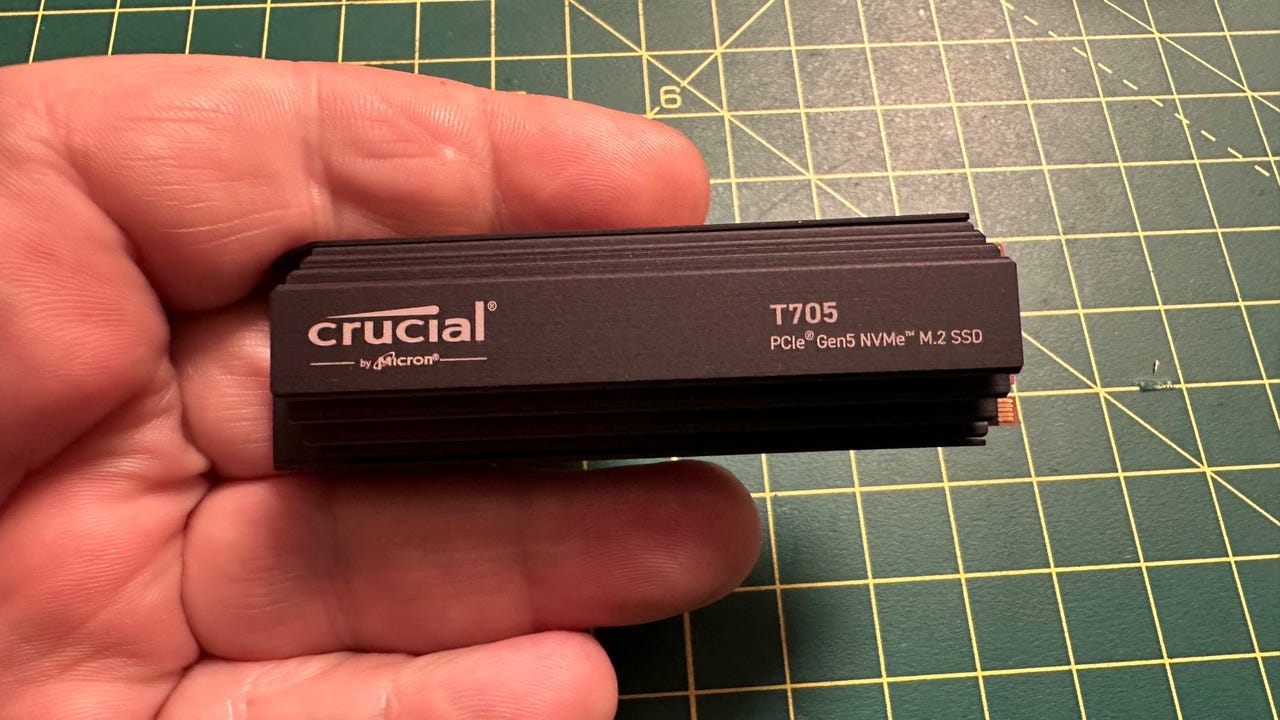
































The Crucial T705 PCIe Gen5 NVMe M.2 SSD features a monster heatsink.
Over the years, I've observed a tendency among users to blame their PC's sluggishness on the CPU or RAM. However, more often than not, the real culprit lies in the storage. Many overlook the significant impact that storage performance can have on overall system speed, mistakenly attributing slowdowns to more familiar components like the processor or memory.
The good news is that the performance of modern storage solutions is extraordinary, boasting read and write speeds that -- only a few years ago -- would have been dismissed as sheer fantasy. Today's storage systems are not only faster but also more reliable and offer much greater capacities, transforming what we expect from our devices and how we use them.
Also: This pocket-sized SSD enclosure makes external drives exciting again
This means that storage is now a key component to consider when you're exploring how to upgrade an existing system.
Over the past couple of weeks I've been testing Crucial's newT705 PCIe Gen5 NVMe M.2 SSD , which the company touts as the world's fastest SSD. And yes, itis blazingly fast -- if you have the hardware to handle it.
Crucial T705 PCIe Gen5 NVMe M.2 SSD
Let's cut to the chase and look at what's important -- performance. The specs provided by Crucial suggest blistering performance by the fastest of the drives, which in this case is the 2TB drive. This SSD boasts an astonishing capability, with sequential read speeds that can reach up to 14,500 MB/s, setting a new benchmark for blistering performance.
1TB | 2TB | 4TB | |
Sequential reads (MB/s) | 13,600 | 14,500 | 14,100 |
Sequential writes (MB/s) | 10,200 | 12,700 | 12,600 |
Random reads (K IOPS) | 1,400 | 1,550 | 1,500 |
Random writes (K IOPS) | 1,750 | 1,800 | 1,800 |
Endurance (TBW) | 600 | 1,200 | 2,400 |
A year ago, Crucial unveiled the T700, boasting sequential read speeds of up to 12GB/s and securing the top spot in performance at the time. Since then, the market has evolved, with SSDs reaching speeds of up to 14GB/s. Despite this progress, the T705 distinguishes itself with a modest but significant boost of 0.5GB/s over its closest competitors, leading it to claim the title of the world's fastest SSD available.
In my real-world testing with a Ryzen 9 7950X system on a Gigabyte B650 motherboard, the T705 delivered speeds that were within 5 percent of its advertised specifications. This performance not only confirms the impressive capabilities of the T705 but also establishes it as the world's fastest SSD.
Also: I found the most secure way to carry data on your keychain
The SSD is offered in three capacities -- 1TB, 2TB, and 4TB -- and is available in three variants to suit different user needs and preferences. These include a bare drive option for those who have their own heatsink; a version equipped with a heatsink for enhanced thermal management; and a limited edition model featuring a white heatsink, which is exclusively available in the 2TB capacity.
The heatsink is particularly impressive. It's a substantial piece of metal designed to increase the surface area available for heat transfer from the chips, thereby facilitating more efficient heat dissipation and maintaining optimal performance.
The heatsink on the T705 is huge.
The heatsink is forged from premium aluminum and copper, and is designed to optimize airflow, eliminating the need for a fan. This design ensures silent operation and reduces the risk of fan-related malfunction.
If using the non-heatsink version, a third-party heatsink must be installed to keep the drive cool.
Another key difference between the T700 and the T705 is that this new drive is compatible with thePlayStation 5 game console , further broadening its appeal and functionality.
Also: The top cloud storage services you can buy to protect your files
The Crucial T705 is slated for global release on March 12, 2024. Pricing begins at$240 for the 1TB bare drive version, with the cost rising to$730 for the 4TB model equipped with a heatsink. The special limited edition, featuring a white heatsink and available only in a 2TB capacity, will be priced at$484.
There are two types of people who will be looking at the Crucial T705.
First, professionals working with video and other huge files who want the maximum performance from their systems because time is money.
Second, power users who want the world's fastest drive for bragging rights -- which is also a valid reason.
Also: The best M.2 SSDs you can buy: Expert tested
Whichever user you are, if you want to get the best out of this drive, you'll need -- at the very least -- an Intel Core 13th or 14th gen or AMD Ryzen 7000 CPU on a compatible motherboard with Gen5 M.2 slot.
If speed is your top priority, this drive is the ultimate choice. It also offers the assurance of a limited 5-year warranty, although if you're truly driven by performance, it's likely you'll upgrade to a newer model well before the warranty period ends.
 Hot Tags :
Tech
Computing
Storage
Hot Tags :
Tech
Computing
Storage